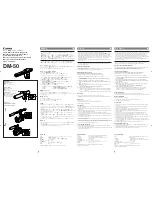
Connecting Audio Output
Plug one end of the audio cable provided into the
AUDIO OUTPUT JACK
(7)
. The other end should be plugged into your camcorder.
Connecting Headphone to Monitor
You can monitor the received signal through headphones, and you will need
to monitor to set the transmitter’s level trim properly. Any “Walkman” type
headsets with a minijack or minijack adaptor can be used, though the signal
may be heard in only one ear unless a stereo-to-mono adapter jack is used.
Monitoring through Receiver
Plug headphones into
HEADPHONE JACK (8)
on the receiver. The
ON/OFF/VOLUME WHEEL (2)
controls volume to the headset. Set the
volume to a comfortable level by rotating the volume wheel. You will be able
to hear the received signal to the receiver when the system is operational.
This is the monitoring method necessary when adjusting the WLT-15
transmitter’s microphone input level per page 6.
Monitoring through Camcorder
Many camcorders allow the user to monitor by providing a headphone jack. If
you plug your headphones into the camcorder, you may need to make a
simple adjustment on the 351 VR receiver. If the sound you hear is
uncomfortably loud or sounds distorted, turn the
AUDIO LEVEL CONTROL
( 9 )
on the back of the
r e c e i ver counter-clock w i s e
until good audio quality is
obtained. If volume is too low,
t u rn the
AUDIO LEVEL
C O N T ROL (9)
c l o ck w i s e
until you obtain comfortable
volume.
Transmitter Set-Up
After completing the above
steps, proceed to instructions
for operating the Nady trans-
mitter included with yo u r
system.
5
WHT HANDHELD MICROPHONE TRANSMITTER
• Features the Nady DM-10D unidirectional neodymium dynamic cartridge
for optimum true sound, maximum feedback rejection and minimal
handling noise
• OFF/STANDBY/ON switch allows convenient audio muting with the
transmitter "ON"
• Low battery LED indicator flashes once for unit "ON"; lights steady for low
battery alert
Operating Instru c t i o n s
1 . U n s c r e
w the
BAT T E RY COMPA RTMENT COVER (18)
and remove,
exposing the battery holder. I n s e rt a fresh
9V ALKALINE BAT T E RY (19)
,
o b s e rving the correct polarity as marked, and screw the cover back on to the
m i c r o p h o n e. M a ke sure the cover is screwed on completely. A fresh alkaline
b a t t e ry can last up to 15 hours in use, but in order to ensure optimu m
p e r fo rm a n c e, it is recommended that you replace the battery after eve ry 10
hours of use.
2 . Tu rn on the WHT by sliding the
O F F / S TANDBY/ON SWITCH (20)
to the
S TANDBY position (transmitter on, audio muted) or the ON position
( t ransmitter and audio both on). The
BAT T E RY INDICATOR LED (21)
w i l l
g i v
e a single quick flash, indicating usable battery strength. In the case of a
dead or low battery, the LED will either not go on at all or will stay on
c o n t i nu o u s l y, indicating that the battery should be replaced with a fresh one.
To preserve battery life, turn the transmitter off when not in use.
3 . The microphone is now ready to use. The
TX LED (6)
on the 351 V R
r e c e i ver should now be lit, indicating a received signal from the tra n s m i t t e r.
When ready to speak, slide the transmitter switch to the ON position.
Receiver Volume Control Adjust
Turn volume control on the 351 VR receiver clockwise to near full gain.
Wearing a monitor headset plugged into the receiver's headset jack, speak
into the lavalier microphone. Adjust the receiver's volume to a comfortable
listening level.
N o t e : Microphone elements can easily be destroyed by the buildup of salts and minerals from
p e r s p i ration and saliva . It is good practice to put a windscreen on the mic element at all times to
protect it.
8
(2)
(5)
(6)
(9)
(3)
(1)
(4)
(8)
(7)
351VRmanbooklet 5/9/07 9:27 AM Page 8























